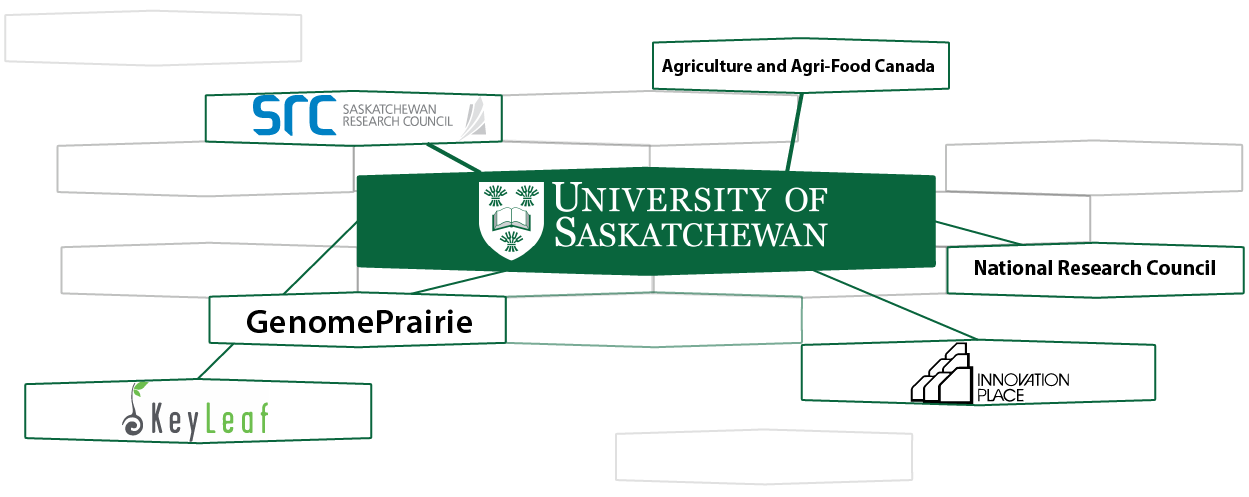Agtech Research
agtech | agritech | agricultural technology | ag tech | agrotech
Seeing beyond.
Being able to see unobstructed in all directions gives you a unique perspective on the "big picture."
University of Saskatchewan brings together leading-edge experts working with innovative producers, using state-of-the-art technology and advanced techniques, to create the digital agriculture revolution needed to feed the world and save the climate.
We're looking to the horizon and seeing beyond.
Join the innovation revolution:
Bringing farming
into the
digital age
As the university the world needs, University of Saskatchewan is helping Saskatchewan and Canada be a global leader in the revolution underway to bring farming into the digital age—discovering and applying cutting-edge technologies to agriculture such as advanced computing, genomics, and new vaccine platforms, for the benefit of local, national and international communities.
Home to a unique agtech hub
USask is the centre of a growing agricultural technology hub that includes Canada’s only synchrotron, one of the world’s largest level 3 containment facilities for infectious disease research, and a unique “smart farming” laboratory for livestock and forage research, as well as federal and provincial labs focussed on agricultural innovation. By co-ordinating with our partners and collaborators, and sharing our state-of-the-art infrastructure capacity, USask is:

- Applying science and advanced technologies
- Increasing value through digital agricultural innovation
- Spanning the agricultural supply chain, not limited to one area or sector
- Focusing on global impact
- Adapting to climate change through agtech solutions
Check out our wide-ranging
"Saskatchewan’s technology sector is a growth driver in our economy and an important future enabler of growth in our agricultural and resource sectors.”
Saskatchewan's Growth Plan (2020)
Advancing Smart Farming

USask and Sasktel have partnered to launch a new smart farming "living lab" at the USask Livestock and Forage Centre of Excellence. Smart farming involves collecting and analyzing “big data” so that producers can make informed and sustainable farm management decisions that improve productivity.
The project brings to bear areas of USask strength in engineering, agriculture and computer science, matched with the infrastructure and expertise at SaskTel.
The LFCE becomes the first research Smart Farm in Canada focused on maximizing efficiency in livestock operations through the latest “Internet of Things”-based technology in an interconnected wireless environment.
The LFCE smart farm will be used to test, develop and demonstrate world-class agricultural technologies such as drones equipped with software and sensors that can monitor livestock herds and their health.
Genome Sequencing
USask-led research teams from the Crop Development Centre and the Global Institute for Food Security have played key roles in the international sequencing of several billion-piece jigsaw puzzles—the genome of multiple crops crucial to global food security for millions of people around the world.
In 2020, USask led an international consortium that has sequenced 15 wheat varieties around the world.
The results will lead to varieties better adapted to climate challenges, with higher yields, enhanced nutritional quality, and improved sustainability.
Vaccine Technology Development

Researchers at USask's Vaccine and Infectious Disease Organization-International Vaccine Centre (VIDO-InterVac) are making progress towards preventing and treating animal and human diseases of today—including COVID-19, Middle-East Respiratory Syndrome (MERS), Zika virus, African Swine Fever (ASF), and Porcine Epidemic Diarrhea Virus (PEDV)—and the emerging threats of the future.
With over 110 Canadian and U.S. patents, VIDO-InterVac scientists are working towards vaccines for bacterial and viral infections, and new, more effective ways of producing and delivering those vaccines.
VIDO-InterVac is home to one of North America’s largest human and animal infectious disease research facilities—with capacity to generate trial data suitable for regulatory approval of new vaccines and anti-infective compounds in highly secure containment facilities (levels 2 and 3).
Work is currently underway to build a new $12-million pilot vaccine manufacturing facility to Good Manufacturing Practices (GMP) standards required for human vaccine production.
Machine Learning for Climate-Smart Crops

Researchers at USask's Plant Phenotyping and Imaging Research Centre (P2IRC) at the Global Institute for Food Security are training computers to precisely analyze digital images of plants and routinely identify traits related to plant growth, health, resilience and yield.
Computer scientists are teaming up with plant scientists, remote sensing specialists and crop breeders to apply machine learning techniques to plant breeding, with a focus on wheat, canola and lentils.
USask researchers are unlocking the ability to tie genes to specific plant traits by applying deep learning to millions of crop images gathered by producers—like using facial recognition software for plants. With new drone-based imaging tools, researchers are also getting access to types of data never measured before.
The results are leading to:
- higher yields in a wide range of growing conditions
- drought resistance
- highly specific data leading to individual healthier plants
- more effective fertilizer and pesticide use


